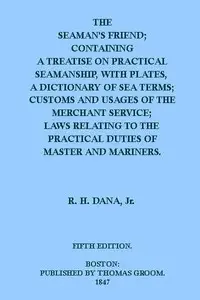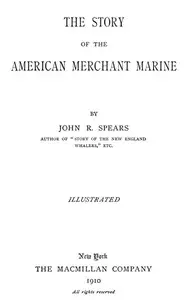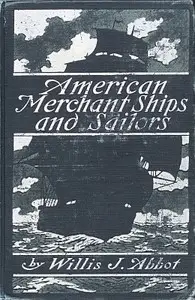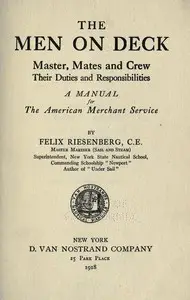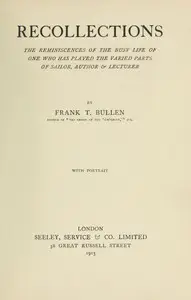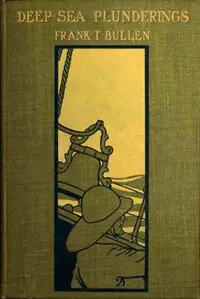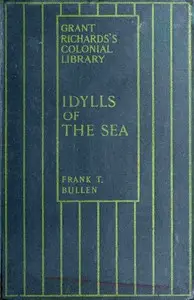"The Men of the Merchant Service" by Frank Thomas Bullen is a guide to what life was like in the British Merchant Service in the late 1800s. The book is written to help potential sailors and their families know what to expect to go into this career at sea. The book explains the different jobs on a ship, what people in those roles do, and what challenges they might face. The author points out that most people don't really understand what the Merchant Service is, even though it's super important for British trade. Bullen wants to fix that by providing solid info, especially for young people thinking about becoming sailors. You'll learn how someone goes from being a trainee to becoming a ship captain, and the qualities you need to get there.
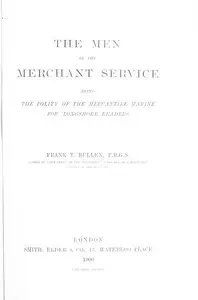
The Men of the Merchant Service Being the polity of the mercantile marine for 'longshore readers
By Frank Thomas Bullen
Discover the rigorous journey, vital roles, and demanding conditions of life at sea in the 19th-century British Merchant Service.
Summary
About the Author
Frank Thomas Bullen, British novelist, was born of poor parents in Paddington, London, on 5 April 1857, and was educated for a few years at a dame school and Westbourne school, Paddington. At the age of 9, his aunt, who was his guardian, died. He then left school and took up work as an errand boy. In 1869 he went to sea and travelled to all parts of the world in various capacities including that of second mate of the Harbinger and chief mate of the Day Dawn, under Capt. John R. H. Ward jun in 1879 when she was dismasted and disabled.
Having spent 15 years of his life at sea, since the tender age of 12, he would later describe the hardships of his early life thus:
I have been beaten by a negro lad as big again as myself, and only a Frenchman interfered on my behalf. Those were the days when boys in Geordie colliers or East Coast fishing smacks were often beaten to insanity and jumped overboard, or were done to death in truly savage fashion, and all that was necessary to account for their non returning was a line in the log to the effect that they had been washed or had fallen overboard.
A parallel may be drawn with Joseph Conrad's career at sea aboard Torrens 1891–1893.
He was a clerk in the Meteorological Office from 1883 to 1889. His reputation was made over the publication of The Cruise of the "Cachalot" (1898); and he also wrote, amongst other books, Idylls of the Sea (1899); Sea Wrack (1903); The Call of the Deep (1907) and A Compleat Sea Cook (1912), besides many articles and essays. He lectured extensively and was highly critical of Australasia's lack of defences against what he saw as imminent naval threats from Germany and Japan. He died at Madeira on 1 March 1915.
Frank Thomas Bullen, British novelist, was born of poor parents in Paddington, London, on 5 April 1857, and was educated for a few years at a dame school and Westbourne school, Paddington. At the age of 9, his aunt, who was his guardian, died. He then left school and took up work as an errand boy. In 1869 he went to sea and travelled to all parts of the world in various capacities including that of second mate of the Harbinger and chief mate of the Day Dawn, under Capt. John R. H. Ward jun in 1879 when she was dismasted and disabled. Having spent 15 years of his life at sea, since the tender age of 12, he would later describe the hardships of his early life thus: I have been beaten by a negro lad as big again as myself, and only a Frenchman interfered on my behalf. Those were the days when boys in Geordie colliers or East Coast fishing smacks were often beaten to insanity and jumped overboard, or were done to death in truly savage fashion, and all that was necessary to account for their non returning was a line in the log to the effect that they had been washed or had fallen overboard. A parallel may be drawn with Joseph Conrad's career at sea aboard Torrens 1891–1893. He was a clerk in the Meteorological Office from 1883 to 1889. His reputation was made over the publication of The Cruise of the "Cachalot" (1898); and he also wrote, amongst other books, Idylls of the Sea (1899); Sea Wrack (1903); The Call of the Deep (1907) and A Compleat Sea Cook (1912), besides many articles and essays. He lectured extensively and was highly critical of Australasia's lack of defences against what he saw as imminent naval threats from Germany and Japan. He died at Madeira on 1 March 1915.

